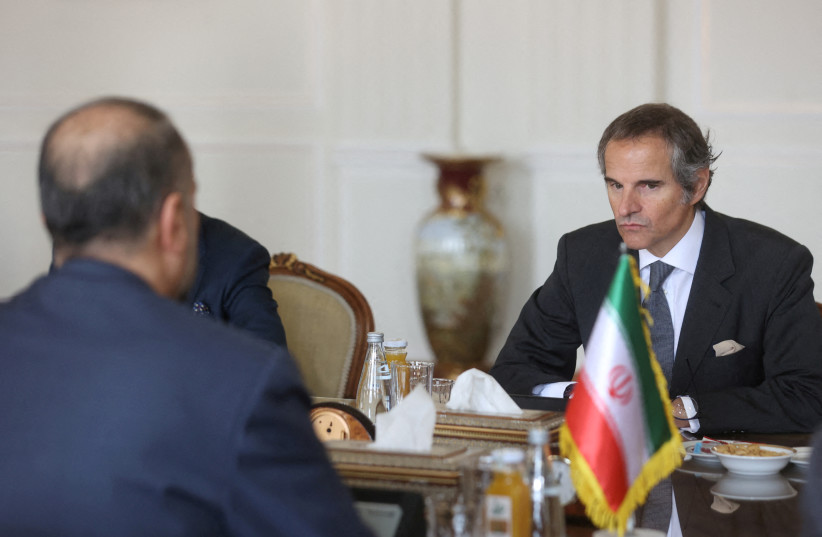IAEA Director-General Rafael Grossi on Monday told the agency’s Board of Governors that Iran is only cooperating with a “fraction” of the nuclear inspection requirements he expected them to comply with under a deal between the sides made on March 4.
After detailing to the board some positive steps Iran had made in restoring some aspects of the agency’s nuclear monitoring, he said, “But this is a fraction of what we envisaged, and what needs to happen now is a sustained and uninterrupted process that leads to all the commitments contained in the Joint Statement being fulfilled without further delay.”
Grossi said that “the Agency has not been able to perform JCPOA verification and monitoring activities in relation to the production and inventory of centrifuges, rotors and bellows, heavy water and uranium ore concentrate [all materials related to nuclear weapons] for two and one quarter years, including the period after June 2022 when no surveillance and monitoring equipment related to [the] JCPOA was installed and operating.”
Next, he said that a partially classified report which he presented to the board “indicates that Iran’s stockpile of enriched uranium has risen by over a quarter in three months. This includes its stockpile of uranium enriched up to 20% U-235, which is approaching half a ton, and its stockpile of high enriched uranium – enriched up to 60% U-235 – which is well over 100 kg.
“In that report you will see that the process of implementation of the March 4 Joint Statement has started and some progress has been made,” said Grossi.

As an example, he said that “in early May the Agency installed surveillance cameras at workshops at one location where centrifuge rotor tubes and bellows are manufactured.”
Further, he noted that “the Agency has, for the first time, installed an enrichment monitoring device at the Fordow Fuel Enrichment Plant as well as at the Pilot Fuel Enrichment Plant in Natanz. This will help us detect more rapidly any variations in enrichment levels at these facilities.”
“We are used to this. One day it’s one side which says one thing, and another day it’s another side. We are neutral, we are technical… I would never comment on a government’s opinions,… this is technical work, what we are saying is technically correct.”
Rafael Grossi
IAEA may keep probes partially open
Concerning specific IAEA probes into alleged Iranian nuclear violations, he said, “Iran has provided a possible explanation for the presence of depleted uranium in one part of the location known as Marivan.”
However, Grossi appeared to not accept Tehran’s explanation and seemed ready to keep the probe partially open, saying, “I note that our assessment for the location still stands and I reiterate that the remaining outstanding safeguards issues stem from Iran’s obligations under the Comprehensive Safeguards Agreement between Iran and the Agency, and still need to be resolved for the Agency to be in a position to provide assurance that Iran’s nuclear program is exclusively peaceful.”
Grossi referred to a “double gap” in the agency’s ability to police Iran’s nuclear program, including losing some of its surveillance tools already in early 2021 and going “blind” with significant other aspects of surveillance in June 2022.
He said that in order to reconstruct the year of surveillance that his inspectors missed, the Islamic Republic would need to facilitate “some other kind of consultation – access to records, talking to people [nuclear scientists.]”
In fact, he added that Iran had allowed his inspectors to speak to some nuclear scientists involved in an incident in which Tehran enriched a small volume of uranium molecules up to 84%, the closest ever to the 90% weaponized level.
However, Grossi said that newly installed surveillance equipment would more quickly catch such incidents in the future, in particular at the underground Fordow nuclear facility where the last incident occurred.
In recent days, several Israeli government officials have attacked the IAEA as being hoodwinked by the ayatollahs into closing the Marivan undeclared nuclear site and depleted uranium probe. But Grossi’s comments suggested he may only shelve the probe – which could keep it open even if the agency does not continue to actively request new clarifications from Iran.
It is unclear if shelving the probe would make it easier for the Iran and the West to return to the 2015 JCPOA nuclear deal, which in any case, appears to be frozen due to Iran’s military drone support for Russia in Ukraine.
At a press conference after his speech to the IAEA Board, Grossi rejected Israel’s accusations about “capitulating to Iranian pressure.”
“We are used to this. One day it’s one side which says one thing, and another day it’s another side. We are neutral, we are technical… I would never comment on a government’s opinions,… this is technical work, what we are saying is technically correct,” said the IAEA chief.
He continued saying the IAEA, “Never water down our standards. We stand by our standards, apply our standards, if anything, in this process... we have been strict technically, impartial, very firm. Fair but firm.”
Further, he said, “politicization is in the eyes of the beholder.”
